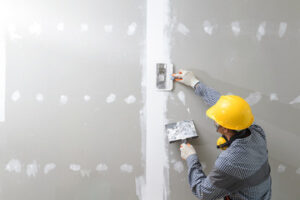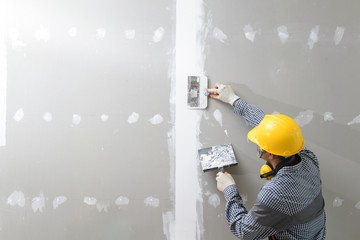Drywall Contractor Nashville TN has the expertise to properly measure rooms and install drywall that withstands years of use. They also understand how to repair walls and make them look like new again.

Licensing rules vary by state, so a drywall contractor must pass multiple tests and meet work insurance requirements before becoming licensed. Advisors help drywall contractors complete steps like registering their businesses and filing paperwork.
A drywall contractor with extensive experience can handle a wide variety of projects and tasks. They can help you choose the right materials for your project and ensure that the installation meets all necessary specifications. They also understand the process of tapeing, mudding, and finishing drywall. This expertise can make all the difference in your finished product, so it’s important to ask potential contractors for references and a portfolio of previous work.
An experienced drywall contractor will be able to answer any questions you may have about the process, timeline, and cost of your project. They can also provide you with a comprehensive breakdown of all materials, labor, and other charges so that there are no surprises down the line. This transparency is essential for managing your construction budget and building trust with your drywall contractor.
Many drywall professionals gain their skills through on-the-job training or by joining an apprenticeship program. They can then pass a series of exams that demonstrate their proficiency in the industry, including how to measure for drywall, how to install sheetrock correctly, and how to properly cover insulation. These tests are often administered by local trade organizations and must be passed before a contractor can earn their license.
As a result of the national housing shortage, builders and remodelers are struggling to find qualified drywall workers. This means that it’s even more important to carefully select the drywall contractor you choose for your next project. Look for a professional with a reputation for quality craftsmanship and excellent customer service.
A good drywall contractor can take your vision for a room and make it come to life. They can create textured finishes, curved walls, and other intricate details that add value to your home or business. Their ability to interpret blueprints and collaborate with designers can also save you time and money. The best drywall contractors offer competitive pricing and will be able to provide you with a detailed estimate before beginning the work. They will also have the proper insurance coverage in case of any unforeseen issues or accidents during the project.
Craftsmanship
Drywall, also known as gypsum board or plasterboard, is a vital component in residential and commercial construction. It is used to build walls, ceilings, and other structures and offers an attractive surface for painting. Professional drywall contractors use their skills and experience to ensure the quality of the finished product. They know how to navigate a variety of room sizes and shapes, and they can handle complex installation tasks such as working around windows, corners, and electrical wiring. This expertise helps to protect the integrity of your building and enhances its aesthetic.
A quality contractor will have a good eye for detail and will pay close attention to the details of your project. They will be able to detect imperfections and repair them accordingly. They will use specialized tools to create a flawless finish and will apply joint compound evenly to avoid any bumps or ridges. This attention to detail will result in a wall that looks perfect under any lighting condition.
Another important aspect of a quality drywall contractor is their professionalism. They should always act in a courteous manner and will respect your home or business. They will also be dependable and show up on time for appointments. This reliability is especially important when hiring a contractor for large projects, as it can help to prevent delays and keep your project on schedule.
It is important to find a licensed contractor who follows strict construction standards and adheres to job site safety regulations. Inquire about their commitment to minimizing risks on the worksite and ask for proof of their insurance coverage. This will give you peace of mind that your project is in good hands.
A drywall contractor with an impeccable work ethic is the best choice for your next project. Their superior craftsmanship and experience will save you money in the long run by preventing costly errors that require frequent repairs or even a complete redo. In addition, they can leverage bulk buying discounts on materials and bring their own specialized tools, saving you the expense of purchasing or renting equipment for one-time use.
Effective Communication
Drywall installation is a project that requires collaboration between the contractor and the customer. This includes sharing ideas, resolving issues, and working together to meet deadlines. A drywall contractor who communicates effectively with their customers can deliver quality results on time and on budget. In addition, effective communication encourages trust and a positive environment.
Effective communication involves listening actively and speaking clearly. It enables individuals to express their thoughts and emotions, and understand others’ perspectives. This type of communication promotes a respectful exchange and builds empathy, enhancing connections with customers, colleagues, and family members. It also teaches respect and courtesy, even in challenging situations, such as misunderstandings or cultural differences.
When choosing a drywall contractor, ask to review their portfolio and speak with past clients. This can provide a clearer picture of the contractor’s craftsmanship and skill level. It can also offer insight into the types of challenges they’ve encountered and how they were resolved.
A reputable drywall contractor should be willing to answer any questions about the project and explain the process in detail. This helps customers make informed decisions about their needs and expectations.
Ensure a smooth, successful project by establishing clear communication channels and scheduling regular meetings. During these meetings, everyone can align on goals and review milestones to avoid miscommunication. Also, keep a record of all communications, including emails, meeting notes, and other documents. This will help resolve disputes and ensure accountability.
In addition to establishing communication channels, it’s crucial to set up task-specific roles for each team member. This will minimize misunderstandings when placing drywall or handling tasks like sanding gypsum dust. Providing regular training to drywall contractors on equipment and best practices can also reduce mistakes.
Lastly, a reputable contractor should be able to explain the costs associated with each task and provide a detailed contract outlining all the project’s details. This ensures that there is no confusion about what services are being provided and provides an opportunity for both parties to make changes before work begins. It’s a red flag if a drywall contractor hesitates or doesn’t provide this documentation.
Licensing
Drywall contractors are required to have a license for their work. They must submit proof of work experience and a background check, then pass an exam to earn their license. They also must carry insurance covering property damage and liability. The licensing process varies by state. Some, like California, require four years of journeyman-level work experience before a contractor can sit for the exam.
Licensed contractors oversee wall and ceiling projects to ensure they meet construction guidelines and safety standards. They also plan project budgets, order supplies and equipment, and handle payroll for their workers. They may also be responsible for hiring subcontractors. Independent drywall contractors must carefully track expenses to prevent costly mistakes. They also have to stay bonded to ensure they can cover any unforeseen costs.
Many drywall contractors pursue certifications to show their skills and improve their prospects for employment. They can attend training programs or apprenticeships, and can also take online study guides for their exams. These guides can help them learn the technical jargon and safety regulations necessary for working in the field. They can then apply this knowledge on the job to meet construction industry requirements.
To become a certified drywall contractor, an individual must undergo training to understand the technicalities of laying out and installing gypsum wall board and gypsum ceiling boards. They must also complete a number of practical assignments to demonstrate their understanding of construction sequences and construction standards. These assignments can include building soundproof rooms, implementing fire-rated systems essential for safety, and applying compound and texturing operations to create a smooth or textured finish.
After completing the training, a drywall contractor must pass a written and practical examination to be awarded their license. They must also submit to a background check and fingerprinting before they can start working on jobs. This is a standard procedure to protect clients and other workers from untrustworthy contractors.
Once they have their license, drywall contractors can build and repair walls and ceilings for residential or commercial properties. They can also use their expertise to assist builders in constructing new buildings.

